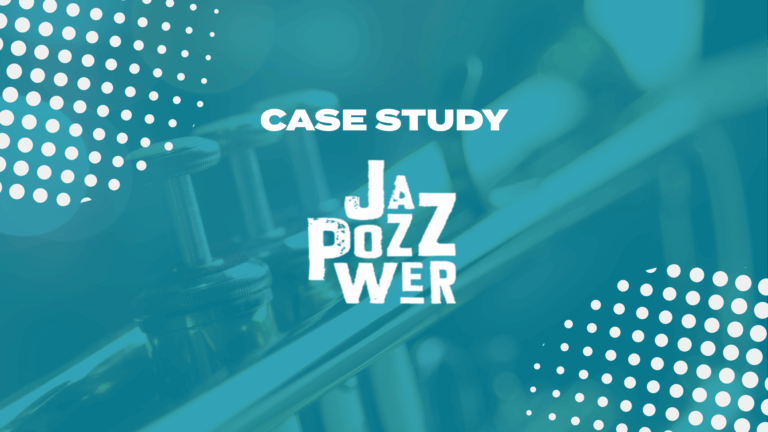Overview
Between late 2024 and into early 2025, Anyone Can Book a Gig (ACBaG) partnered with Jazz Power Initiative (JPI) to pilot a new guided version of the ACBaG course for six mid-career jazz artists in the New York City area. The program was designed to provide direct mentorship and structured learning, meeting the artists where they were in their journey and offering them a clear, actionable roadmap to take their careers to the next level.
About Jazz Power Initiative
Founded in 2003, Jazz Power Initiative is a non-profit organization in Manhattan with the mission to transform lives through jazz arts education and performance. Over the years, JPI has grown to become a leading community-based arts organization, offering quality youth musical education, community concerts, and artist and teacher training.
A previous partner of ACBaG, this collaboration came out of JPI’s desire to further education programs for mid-career musicians and the potential for ACBaG to be taught in a new, guided format.
Find out more about Jazz Power Initiative and their programming at jazzpower.org.
Program & Structure
Over the course of the program, participating artists engaged with the ACBaG team for six live, interactive teaching sessions, spaced roughly every two weeks—one per module of the ACBaG course. These sessions provided real-time support on course materials, anecdotal insights from the team’s experience, and hands-on exercises tailored to each artist’s career goals.
In the off weeks, artists worked through the next chapter of the course themselves, making note of any potential questions or concerns for discussion in the following session for that module. They also completed assignments matched with the chapter, including writing or revising their artist biography, assembling an EPK, filling out a tour history template, etc.
The teaching sessions covered:
- Getting Started — The ACBaG team started the program by having artists evaluate their career so far, focusing on achievements and goals for the future. These points can then be used for future career planning and building an effective artist biography. Focus was placed on the personal difficulties of finding confidence when discussing one’s own work, and artists found support on this issue from the team and each other.
- Setting Up Your Business — The session covered EPKs and the various formats in which these resources are presented in the industry. Using real examples from our agency, artists were walked through the kind of assets they should have as well as the best ways to organize and easily share those resources.
- Research & Development — Through the process of researching themselves and similar artists, this session guided artists through the techniques of planning tours and preparing for negotiation. Artists built a tour history and learned strategies to find similar artists for comparison, inspiration.
- Negotiating Deals — Now that we had covered the research necessary to prepare for negotiation, this session focused on the process itself. Artists were given the opportunity to role-play in a mock negotiation setting with agents from our team. Learning best practices in this way prepares artists for the realities of meeting with promoters.
- Contracts & Riders — Music Works International’s Contract Administrator joined the session to give an overview of why contracts are essential for artists, discuss the essential parts of both contracts & riders, and walk artists through using the templates provided by the course to build their own administrative documents.
- Marketing & Promotion — Led by Music Works International’s Marketing & Creative Manager, this section of the course focused on strategies artists can use to drive ticket sales once a show is booked. Key points were an emphasis on collaboration with promoters, social media strategies, and direct marketing such as email or text lists.
Impact & Effectiveness
According to JPI, one of the key benefits of our structured approach was the opportunity for artists to dedicate time solely to business development and career planning. All of the artists who participated in the program were actively performing professionals who also supported themselves through teaching or other secondary endeavors. The time needed to plan for their playing career was difficult to find. Our six-session program created a built-in structure, making it easier for artists to carve out that time, stay focused, and do the work that drives long-term growth.
Key Outcomes:
- In a post course survey, artists were asked to rate the course’s usefulness to growing their career on a scale of one-to-five. All artists to complete the survey rated the program as a five.
- Artists noted that each session provided a different way in which they should prepare their professional business, and the program’s structure was effective in spending time on each separately to build progress over time.
Looking Ahead
Following the success of this pilot program, ACBaG and JPI are exploring opportunities to continue our partnership, perhaps on an annual basis. JPI’s strong involvement with the Jazz education scene of NYC places them in a position to meet numerous artists and educators who would benefit from participation in a structured booking program. Both organizations agree that this provides great potential for future collaboration and the possibility to continue elevating artist careers.
This case study highlights how structured, tailored education and mentorship can bridge the gap between artist talent and career success. Investing time to learn and implement simple, proven strategies can give artists the edge when building successful and sustainable performance careers.


